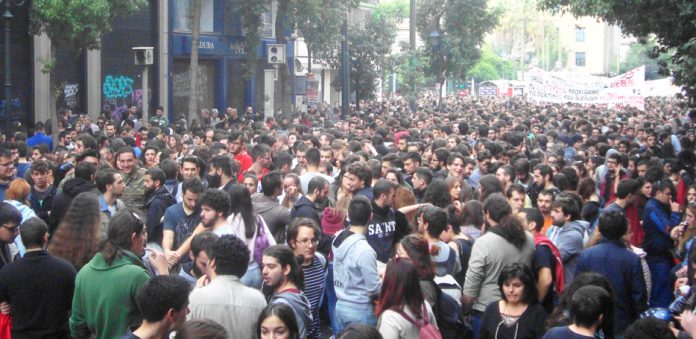OVER 35,000 university and school students, youth and workers joined the 41st Anniversary March of the Athens Polytechnic Uprising in Athens on Monday.
They were chanting slogans against NATO, the EE and the Greek coalition government, against imperialism and war, for the victory of Palestine, and for occupations to fight the government’s savage austerity policies.
Tens of thousands took part in rallies and marches held in all Greek cities. But the marches in all the major Greek cities were viciously attacked with tear-gas by the armed riot police squads, MAT, and the DIAS riot police on motorcycles.
Many demonstrators were injured and there were over 100 people arrested in Athens in a major police operation involving at least 5,000 police of all kinds.
The Athens city centre was saturated by police literally on every corner, with armed riot police in paramilitary brown or blue uniforms, ordinary police, plus plainclothes police in groups of four, checking youth searching their bags.
Despite the previous week’s MAT attacks on university and school students and the build up of an atmosphere of fear by the police and government, this year’s Polytechnic March in Athens attracted tens of thousands who kept on chanting anti-imperialist and anti-government slogans throughout the march.
At the front of the march the large Athens Polytechnic banner proclaimed: ‘Youth will live free – against oppression and terror – on November’s road we are fighting for Academic Asylum – Democracy – Rights – Bread – Education – Freedom – We are overthrowing the government – European Commission and IMF!’
Behind the large banner a smaller one stated: ‘The Army murders in war and in peace – We are not fighting for USA-European Commission-Greek Oligarchy’.
Behind the students’ contingents marched large contingents of school teachers, university lectures, university administrative workers and technicians, sacked teachers and school guards, delegation of the sacked women cleaners, delegation of the sacked ERT radio and TV workers, and then ministries and local government employees.
These were followed by contingents of private section trades unions, political exiles, refugees and migrants organisations and political parties.
At the main Athens Syntagma square the march had to pass through a corridor with hundreds of riot police on both sides along with police buses.
But marchers were not intimidated and shouted ‘MAT and the police out of the march’, ‘MAT must be disbanded’ and ‘MAT you are pigs and murderers’.
When the head contingents of the march reached the dark American Embassy compound, the MAT riot police unleashed a co-ordinated attack with noise and lighting bombs, tear-gas canisters and their truncheons against contingents about half a mile away from the American Embassy.
According to eye witnesses, broadcast on radio and television, MAT attacked, shouting obscenities, making indecent signs with their hands, threatening with death women, truncheon hitting and kicking everyone in sight.
The march was broken into two, but demonstrators regrouped and marched to the US Embassy despite suffering from the tear-gas.
Once past the US Embassy the students’ contingents, about 10,000 people, turned to march back to the Polytechnic.
They were once again attacked by MAT riot police and they had to set rubbish bins on fire to protect themselves against the tear-gas and the DIAS riot police motorcycle attacks.
When students reached the Polytechnic area they were attacked again by MAT riot police who had also surrounded the Polytechnic campus so that no-one could enter.
As students tried to make their way into the Polytechnic the whole district was transformed into a battleground as MAT and DIAS squads went wild.
They hit anyone around with their truncheons, including a German stranded student, and smashed their way into shops and apartment blocks.
In their leaflet distributed during the march, the Trotskyists of the Revolutionary Marxist League (RML) stated that ‘the operations of the praetorian guard of the coalition government, a parliamentary junta, aim to terrorise, oppressed and defeat the revolutionary occupations movements of university and school students and the working class movement ahead of the one-day general strike of 27 November’.
The RML’s statement said that, ‘the pressures of the world economic crisis and the demands of the EC-IMF-ECB troika on the Greek coalition government on the one hand, and the revolutionary nature of the resistance of the youth and workers on the other, have created a huge political crisis not just for the government but for the whole bourgeois order.
‘Now is the time to fight to transform the one-day general strike into an indefinite political general strike for the overthrow of the government and of capitalism, as the banners of the students demand.’
